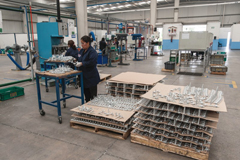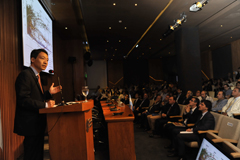Evaluating the Kaizen Project Based on a Survey of Management and Employees in Eight Countries of Central and South America: Go Shimada Gives a Presentation in Argentina
2017.04.19
On March 10, 2017, JICA Research Institute (JICA-RI) Visiting Scholar Go Shimada (Associate Professor, University of Shizuoka) gave a presentation at a seminar on Japanese-style management held in Argentina. In his presentation, Shimada explained the impact of the Kaizen Project to improve quality and productivity at small and medium-sized companies. He based his remarks in the results of the interview survey he conducted on management and employees at companies in eight countries in Central and South America.
The seminar was hosted jointly by JICA, the Embassy of Japan in Argentina, the Argentine Chamber of Commerce (CAC) and the Argentine National Institute of Industrial Technology. Sponsorship was provided by the Argentina Industrial Union and CAECE University.
"Kaizen activities" is a term for efforts implemented to improve quality and productivity in each workplace according to the type of industry, size and production environment. It is said to be one of the factors that affected Japan’s high growth from production sites. Shimada pointed out it is necessary to improve productivity and quality to promote industry, and that small and medium-sized companies are the engine for economic growth. He highlighted his remarks with graphs and charts showing the current state and changes in some countries, including Argentina and Japan. In that context, he described the impact of the JICA Kaizen Project.

'Kaizen' has been widely adopted in companies in Africa (Photo: JICA/Kenshiro Imamura)
Shimada showed the interim report on quantitative analysis he is conducting jointly with Tetsushi Sonobe (Vice President, National Graduate Institute for Policy Studies). They are conducting the research in eight countries in Central and South America (Guatemala, Belize, Honduras, El Salvador, Nicaragua, Panama, Dominican Republic and Costa Rica). Shimada and his colleagues conducted interview surveys of management and employees of companies that were involved in JICA’s "Project for Capacity Building of Facilitators on Improving Productivity and Quality for Small and Medium Enterprise in Central America and Caribbean Region" (2009 to 2013). They analyzed the impact of the JICA project using the trend score matching method, which compares companies supported by the project with companies in the comparison group.
Shimada said the results of the analysis have shown positive impact on the cooperative relationships between management and laborers (and between laborers), improvement of productivity, improvement of the work environment, increase of wages and increase of the cost that the management is willing to spend on Kaizen training.
Shimada also pointed out that 20% of management and about 35% of employees responded they felt the usefulness of Kaizen three months or more after the project started. Some responses indicated it was difficult to gain understanding of laborers toward implementation of Kaizen. Shimada also said it was necessary to understand it took time for the impact of implementing Kaizen to become evident, and explained that thinking out a plan to get the understanding of laborers was an important point for implementation.

Go Shimada, visiting scholar of JICA-RI, makes a presentation
At the seminar, Noriteru Fukushima, Japanese Ambassador to Argentina, gave a speech and Naoto Mukai, Senior Deputy Director, Industrial Development and Public Policy Department, JICA introduced the Kaizen Project being conducted in various countries around the world. Marcos Ignacio Rodriguez of Argentina’s National Institute of Industrial Technology introduced cases of success in Argentina. Representatives from Toyota Argentina and Honda Motor Argentina reported on Kaizen efforts in Argentina, and finally, Tatsuhiro Mitamura, Chief Representative, JICA Argentine Office closed the seminar touching on the history of Kaizen.

事業事前評価表(地球規模課題対応国際科学技術協力(SATREPS)).国際協力機構 地球環境部 . 防災第一チーム. 1.案件名.国 名: フィリピン共和国.

事業事前評価表(地球規模課題対応国際科学技術協力(SATREPS)).国際協力機構 地球環境部 . 防災第一チーム. 1.案件名.国 名: フィリピン共和国.

事業事前評価表(地球規模課題対応国際科学技術協力(SATREPS)).国際協力機構 地球環境部 . 防災第一チーム. 1.案件名.国 名: フィリピン共和国.

事業事前評価表(地球規模課題対応国際科学技術協力(SATREPS)).国際協力機構 地球環境部 . 防災第一チーム. 1.案件名.国 名: フィリピン共和国.

事業事前評価表(地球規模課題対応国際科学技術協力(SATREPS)).国際協力機構 地球環境部 . 防災第一チーム. 1.案件名.国 名: フィリピン共和国.
scroll